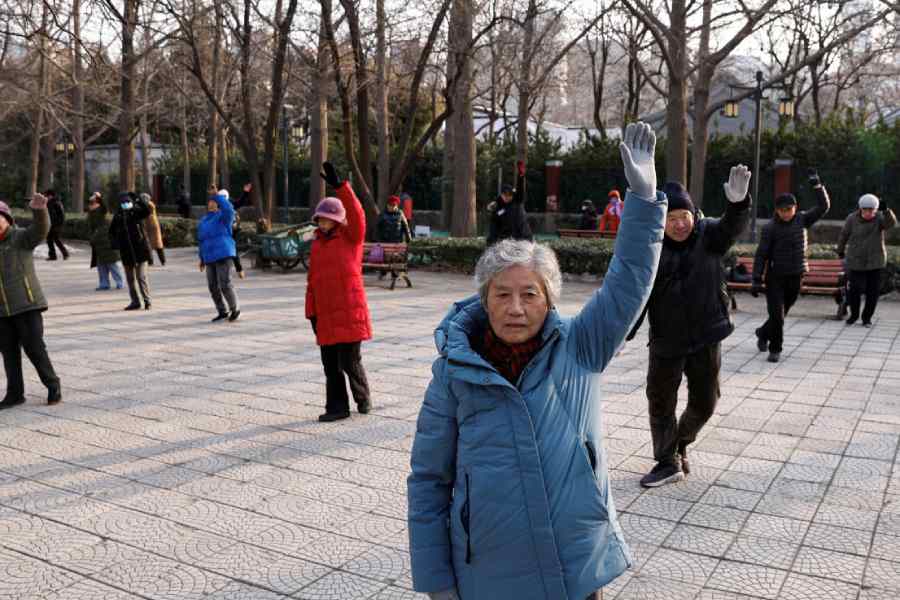The Chinese government on Friday approved a plan to raise the country’s statutory retirement age, currently among the lowest in the world, in a long-awaited but broadly unpopular effort to address the challenge of its rapidly ageing population.
This is the first time China has raised its retirement age since the 1950s. It will be phased in gradually, starting on January 1, 2025. The retirement age for men, previously 60, will increase in increments of several months before finally reaching 63 by 2040. The retirement age for women in white-collar jobs, previously 55, will rise to 58. Women in blue-collar jobs, who previously could retire at 50, will have to work until 55.
The decision would “maintain the momentum and vitality of economic and social development”, Wang Xiaoping, China’s minister of human resources and social security, said at a news conference.
Policymakers and experts have for decades been calling for a change to the retirement age, noting that the previous rules dated from a time when life expectancy in China was much shorter, and fertility rates higher. They warned that maintaining the status quo would severely strain the country’s workforce and pension funds, with large numbers of older Chinese retiring but fewer young people replacing them.
China’s working-age population has been falling since 2012, according to official statistics, with an average annual decrease of more than 3 million people. Last year, China had 297 million people over 60 years old, or about 21 per cent of its population.
But the proposal faced broad opposition, from older workers as well as from younger ones, who worried that an expanded workforce would mean even tougher competition for jobs. China also lacks a strong social safety net, and age discrimination by employers is common, leaving many blue-collar workers to worry that they would be left without work but unable to draw on pensions.
In a sign of how sensitive the issue was, the government has promised before to raise the retirement age, only to backpedal in the face of public outcry.
In some ways, now is a particularly bad time for the government to follow through. China’s economy is still struggling to recover from the coronavirus pandemic. Youth unemployment remains high. Local governments, which administer pensions and other government benefits, have already cut back on payouts in recent years — at times setting off protests.
But the government most likely realised it had no more time to delay, said Alfred Wu, a professor of public policy at the National University of Singapore, who noted that he was surprised by the speed with which the government had ultimately made its move. (The legislature had announced earlier this week that it was reviewing a draft law, and there was no public comment period as is common for many laws.)
“I think China has lost a lot of golden opportunities” to make the decision more palatable to the public, Professor Wu said. “Maybe another way is just to release it. Let people accept it, and they move forward.”
Acceptance did not seem to be the initial public reaction.
On Chinese social media, where several hashtags about the decision led the trending topics, users complained that they would have to wait even longer to receive benefits that they decried as too low anyway.
Others worried that the pension funds would be even more depleted by the time they finally got to retire. The government-backed Chinese Academy of Social Sciences has previously projected that China’s pension funds would run out of money by 2035.
The decision announced on Friday will also lengthen the time people must pay into pension funds before becoming eligible to receive a monthly pension, to 20 years from 15.
In an apparent effort to ease people’s concerns, the plan included what it described as a flexible option for people to retire up to three years earlier — that is, at the current retirement age — if they had fulfilled the 20-year contribution requirement.
“The decision reflects respect for individual wishes. It does not force everyone to reach the new statutory retirement age,” Xinhua, the official news agency, quoted a professor at Zhejiang University, Jin Weigang, as saying.
The raising of the retirement age by three years for most workers was less than the five years many had expected.
The government also promised to improve the system for paid annual leave, fight age discrimination and offer earlier retirement for workers in physically demanding jobs.
It said it would work to establish universal child care — another step that could be crucial for ensuring that the delayed retirement age does not inadvertently worsen the population ageing problem, by discouraging people from having children.
Currently, many retirees take primary responsibility for raising their grandchildren.
Besides those reassurances, the government also had another tool to ensure that public backlash did not spiral out of control: censorship.
New York Times News Service










